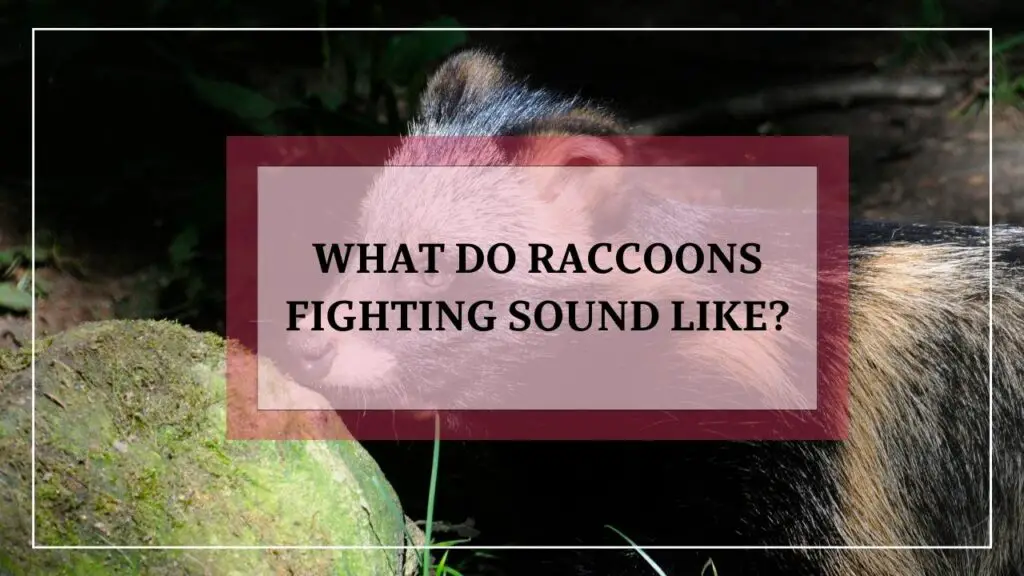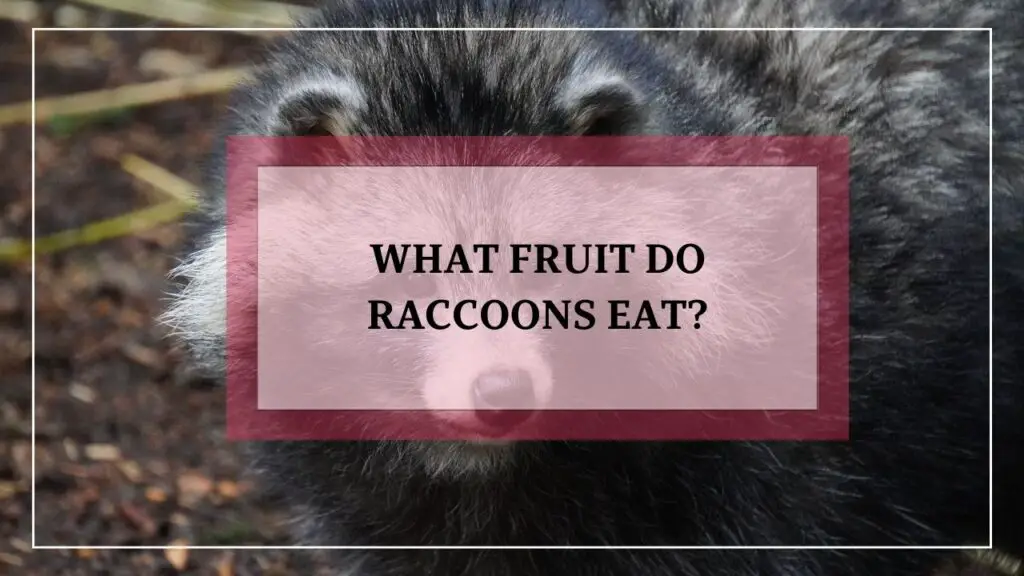Have you ever wondered what raccoons fighting sound like? Well, get ready to explore the wild world of these mischievous creatures! Raccoons are small mammals that live in forests and sometimes even in cities. They have a unique appearance with their black masks and ringed tails. Raccoons are known for being clever and curious, but did you know that they can also be quite feisty?
When raccoons fight, they make a variety of sounds. It’s like they’re having their own little boxing match! They growl, hiss, screech, and even make chattering noises. These sounds can be quite loud and intense, like a mix of angry cats and squeaky toys. Raccoons fight to defend their territory or to show dominance over others. It’s their way of communicating and settling disputes. So, if you ever hear strange noises outside at night, it might just be some raccoons having a rowdy wrestling match!
Why Do Raccoons Fight?
Understanding territorial behavior in raccoons
Raccoons are fascinating creatures that are known for their territorial behavior. Just like humans, raccoons have a strong desire to claim and protect their own space. Territories are essential for raccoons as they provide a stable source of food, shelter, and mates. These areas allow raccoons to establish and maintain their own little kingdom.
To mark their territories, raccoons use various methods such as scent marking. They have scent glands located on their paws and anal region, which they use to leave their unique scent on trees, rocks, and other objects. This helps them communicate with other raccoons and establish boundaries.
However, conflicts can arise when raccoon territories overlap. Raccoons are not known for their social skills and are not particularly fond of sharing their space. When two raccoons with overlapping territories meet, it can result in aggressive behavior and fights as they try to assert their dominance and defend their territory.
Related Article:What Do Raccoons Sound Like When They’Re Fighting?
Exploring mating season as a cause of fights
Mating season is another common reason for raccoon fights. During this time, male raccoons become highly competitive as they vie for the attention of female raccoons. They will fight with other males in an attempt to establish their dominance and secure the opportunity to mate.
These fights can be quite intense and can involve loud vocalizations, scratching, and biting. It’s nature’s way of ensuring that only the strongest and fittest males pass on their genes to the next generation of raccoons.
So, the next time you hear raccoons fighting, remember that it could be due to territorial disputes or the pursuit of love. These furry creatures may seem cute and cuddly, but when it comes to defending what they believe is rightfully theirs, they don’t back down.
Now that we understand why raccoons fight, let’s dive into the different sounds they make during these encounters.
Identifying Raccoon Fighting Sounds
Now that we know why raccoons fight, let’s talk about how to identify their ferocious sounds. Raccoons might not have the best singing voices, but they sure know how to make a ruckus. They have a range of vocalizations that can give you a clue about what’s going on.
Related Article:What Do Raccoons Sound Like At Night?
During a fight, raccoons can make all sorts of sounds. You might hear growls, hisses, screeches, screams, and even chatters. It’s like a raccoon battle choir trying to hit all the right notes. Each sound has its own meaning, like a secret raccoon language. So, if you’re keen on being a raccoon whisperer, pay close attention to these vocal cues.
What to Do If You Hear Raccoon Fighting Sounds
Now, if you happen to hear raccoon fighting sounds in your neighborhood, it’s essential to approach the situation with caution. While it might be tempting to jump in and break up the fight, remember that raccoons can be feisty and unpredictable. Your safety should always come first.
Instead, find a safe spot at a distance and observe the drama from afar. Grab some popcorn (just kidding) and let nature take its course. If things escalate or pose a threat to humans or pets, it’s best to call local animal control for assistance. They’re the experts and can handle the situation properly.
To prevent raccoon fights on your property, it’s crucial to eliminate any enticing food sources. Secure your garbage cans and compost bins, as raccoons are known for their dumpster diving skills. It’s like an all-you-can-eat buffet for them! Also, make sure to seal off any potential entry points to your buildings and sheds, because raccoons are expert climbers and sneaky little creatures.
Additional Facts and Tips about Raccoons
Now that we’ve covered raccoon fighting sounds, let’s dive into some additional facts and tips about these fascinating creatures! Raccoons are truly remarkable animals, and understanding more about their behavior can help us coexist with them in harmony. So, grab a cup of coffee and let’s learn some more about these clever critters!
Related Article:What Do Raccoons In Chimney Sound Like
Interesting Facts about Raccoons
Did you know that raccoons are incredibly adaptable? These little bandits can thrive in a variety of environments, from forests to cities. They have a knack for finding food wherever they go, whether it’s raiding your garbage can or scouting out tasty treats in the wild.
Raccoons are also known for their dexterity and problem-solving abilities. They have nimble fingers that can manipulate objects, making them excellent at opening containers and figuring out how to get into your bird feeder. If you’ve ever watched a raccoon in action, you’ll be amazed at their resourcefulness!
Another interesting fact about raccoons is that they have an omnivorous diet. They’ll eat just about anything they can get their paws on, from fruits and vegetables to small animals and insects. This scavenging behavior is a key part of their survival strategy, and it’s what makes them such successful foragers.
Raccoon-Proofing Your Property
If you want to avoid any unwanted encounters with raccoons on your property, there are a few things you can do to deter them. One effective method is using motion-activated sprinklers. These devices use sensors to detect movement and will spray a burst of water when a raccoon gets too close. Trust me, raccoons don’t like getting wet!
Ultrasonic devices are another option. These emit high-frequency sounds that are unpleasant to raccoons, but inaudible to humans. It’s like playing Justin Bieber on repeat – it’s enough to drive anyone away!
For those of you with furry friends, it’s important to secure pet doors to prevent raccoons from sneaking in. Raccoons are clever climbers and can easily gain access to your home if given the chance. So don’t leave any doors open for these crafty critters!
Related Article:What Do Raccoons Like
Closing Thoughts
Well, my friend, we’ve covered a lot of ground today. We’ve learned about raccoon fighting sounds, discussed the importance of understanding raccoon behavior, and explored some interesting facts and tips. I hope you’ve found this information helpful and entertaining.
Remember, raccoons are curious and intelligent creatures, and it’s our responsibility to coexist with them in a respectful manner. By understanding their behavior and taking steps to prevent conflicts, we can create a harmonious balance between humans and raccoons. So, be smart, be safe, and embrace the wonder of these clever little bandits!
FAQs
What do raccoons fighting sound like?
Raccoons fighting can produce a range of sounds, including growls, hisses, screeches, and screams. These sounds can be loud and unsettling, often resembling a combination of cat fights and baby crying. Raccoon fights can be intense and aggressive, often accompanied by loud thumps and rustling noises as they tumble and wrestle with each other.
Are raccoon fights dangerous?
Raccoon fights can be dangerous for the animals involved, as they can cause injuries such as bites and scratches. However, raccoons typically engage in fights to establish dominance or defend their territory, rather than actively seeking out conflict with humans. It is important to avoid getting in between fighting raccoons, as they may perceive you as a threat and could attack in self-defense.
What should I do if I hear raccoons fighting near my house?
If you hear raccoons fighting near your house, it is best to avoid intervening directly. Raccoons are wild animals and can be unpredictable. It is recommended to keep a safe distance and ensure that your pets or children are indoors. If raccoon fights become a recurring issue, it may be wise to contact a local wildlife control professional who can assess the situation and provide appropriate solutions.
Related Article:What Do Raccoons Sound Like When They’Re Mating?
Conclusion
In conclusion, understanding raccoon behavior, including their fighting sounds, is crucial for both our safety and the well-being of these fascinating creatures. By knowing why raccoons fight and how to identify their vocalizations, we can better navigate encounters with them and take appropriate precautions. Remember to prioritize personal safety when approaching raccoon fights and observe from a safe distance. Taking steps to prevent raccoon fights on your property, such as securing garbage cans and sealing off potential entry points, can also reduce conflicts. Additionally, learning about raccoons’ adaptability, intelligence, and foraging behavior can help us coexist with these resourceful animals. Feel free to share your own experiences or ask questions in the comments section below.

Hi, I’m Ali Tarek, the founder of Animalsman. I’ve always been passionate about pets, especially dogs and cats, and I created this website to share practical tips, easy recipes, and helpful care advice for fellow pet lovers. My goal is to make pet care simple, enjoyable, and accessible for everyone. When I’m not writing or curating content, you’ll usually find me spending time with my furry friends or learning new ways to keep them happy and healthy.



